Exploring Pure Gold Real Estate Development in Dubai
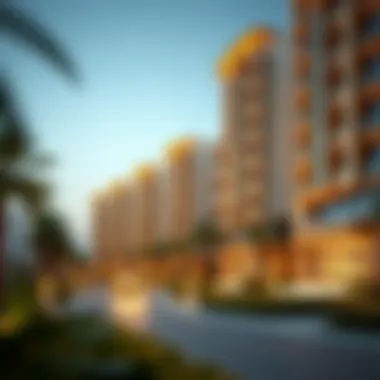
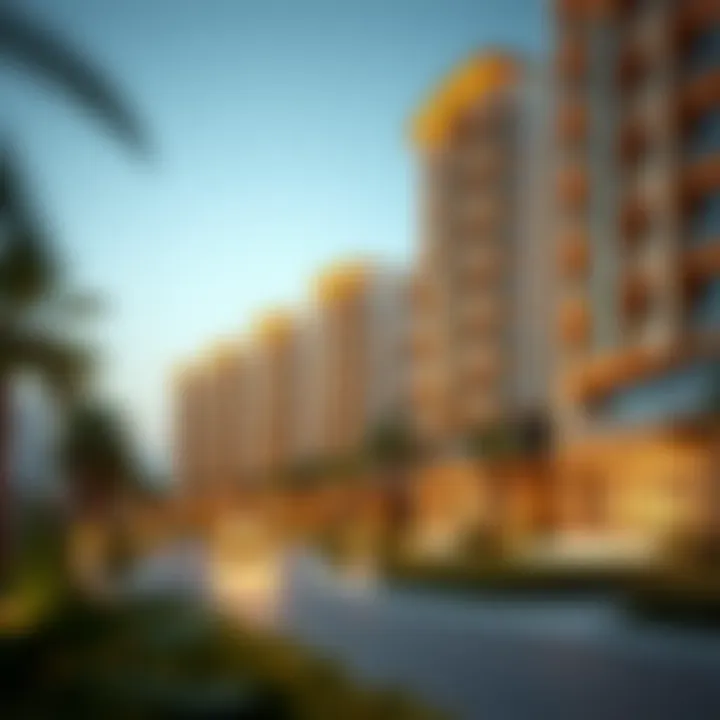
Intro
Dubai offers plenty of opportunities for those interested in real estate, yet what sets apart the best developments in this bustling market? Pure gold real estate development is not merely a fancy label. It signifies a commitment to excellence and sustainability in every aspect—be it architectural innovation, luxurious living, or community integration. For investors, homebuyers, realtors, expatriates, and developers, understanding the ins and outs of such prestigious projects could prove pivotal in making informed decisions.
Delving deeper into what defines these high-quality developments reveals a complex interplay of market trends, pricing fluctuations, and the legal landscape surrounding property acquisition. To cut through the noise, this article aims to equip readers with a granular understanding of various components that contribute to the allure of pure gold real estate in Dubai.
With insights into current trends, price forecasts, and the essential steps one must undertake to smartly navigate property purchases, you will gain a comprehensive snapshot of the real estate landscape. Let's dig in, starting with the current market insights that set the stage for this alluring segment.
Defining Pure Gold Real Estate Development
Understanding what constitutes pure gold real estate development in Dubai is crucial for anyone looking to delve into this lavish realm of property investment. This concept isn’t merely about luxurious finishes or prime locations. It embodies a holistic approach that intertwines quality, innovation, sustainability, and socio-economic impact.
One of the primary benefits of focusing on pure gold developments is that they typically promise higher return on investment. Investors can often count on the attractiveness of these properties, which foster longer-term appreciation. With an evolving market landscape, discerning buyers want more than just brick and mortar; they seek value-added experiences.
Conceptual Framework of Pure Gold Real Estate
The framework that defines pure gold real estate is built on several pillars: design excellence, sustainability, and community engagement. High-quality developments, for instance, don’t just tick boxes for aesthetic appeal. They also integrate smart technologies aimed at enhancing user experience while conserving resources.
A noteworthy aspect of this framework is the application of cutting-edge materials and construction techniques. Developers increasingly focus on sustainable practices, an aspect that's resonating well with today’s environmentally conscious buyers. Taking cues from global standards, Dubai’s property sector is elevating its game to ensure developments are not just structurally sound, but also eco-friendly and energy-efficient.
Characteristics of High-Quality Developments
What sets high-quality developments apart? Some key characteristics are:
- Location: Premium developments are usually situated in strategic locations, such as near business hubs or recreational areas, ensuring accessibility and ultimately value retention.
- Architectural Innovation: Designs that are unique and reflect the cultural fabric of Dubai stand out. This is not mere ornamentation; it signifies a commitment to identity and heritage.
- Amenities and Lifestyle: A modern lifestyle calls for extensive amenities. Pure gold developments include features like gyms, swimming pools, and communal spaces that elevate overall living standards.
- Sustainability Features: Integration of renewable energy sources and sustainable materials contributes to global efforts to mitigate climate change, making these properties appealing to both investors and end-users alike.
"Investing in high-quality real estate is like acquiring a piece of future gold; as the landscape evolves, so does the foundational value created through thoughtful development."
In summary, defining pure gold real estate development in Dubai involves a deep dive into quality, community, and sustainability. This focus not only champions impressive architecture but also cultivates a thriving economic environment that appeals to an affluent, discerning clientele.
Historical Context of Real Estate in Dubai
Examining the historical context of real estate in Dubai yields crucial insights for investors and stakeholders engaged in the dynamic market today. Dubai's real estate scene has drastically evolved over the last few decades, moving from an economy largely dependent on oil to one that thrives on tourism, trade, and, most importantly, real estate development. Understanding this transformation helps contextualize current developments, investment opportunities, and potential challenges faced by the industry.
Evolution of the Dubai Real Estate Market
The roots of Dubai's real estate boom can be traced back to the 1990s when the city began to reform its economic policies and diversify its income sources. The establishment of the Dubai Land Department in 2006 was a pivotal moment. It provided regulatory oversight and contributed to establishing a more transparent market. This era saw initiatives like freehold properties, which allowed foreign investors to own property, drawing a global audience.
The introduction of the Burj Khalifa in 2010 symbolized this evolution, boasting not only the title of the world's tallest building but also positioning Dubai as a focal point for luxury living and tourism. Moreover, the Expo 2020, despite facing challenges due to global events, highlighted Dubai's push toward sustainable and innovative constructions, reinforcing its attractiveness to foreign investors.
Economically, the real estate market is deeply intertwined with Dubai's ambitions for global prominence. The government's continuous efforts to improve infrastructure, ranging from roads to airports, have played an essential role in shaping the landscape. As one of the fastest-growing cities globally, Dubai's market responded well to increased demand, with residential and commercial projects sprouting at an astonishing rate.
"Since the late 1990s, real estate in Dubai has become not just a market but a crucial segment of its economic fabric, symbolizing wealth and global business engagement."
Influential Projects Shaping the Industry
Several landmark projects significantly impacted the trajectory of Dubai's real estate development. These include:
- Palm Jumeirah: A marvel of engineering and design, this man-made island created a new standard for luxury, with high-end resorts and villas shaping the skyline and lifestyle of the affluent.
- Dubai Marina: Illustrating high-rise living, this project sparked a trend toward waterfront properties, showcasing a range of amenities catered to a cosmopolitan lifestyle.
- Downtown Dubai: Home to the Burj Khalifa and the Dubai Mall, this area represents the heart of the city's commercial and cultural dynamics, attracting millions of tourists annually.
These projects have not just architectural significance; they embody a shift in urban planning and development priorities, emphasizing sustainability and community-centric designs.
In summary, gaining insight into the historical context surrounding real estate in Dubai lays a strong foundation for understanding current trends and future projections. The market has transitioned from a niche segment to a central driver of economic growth, influencing lifestyle choices and the global image of Dubai. Understanding this evolution is indispensable for anyone looking to leverage opportunities in Dubai's pure gold real estate landscape.
Economic Impacts of Pure Gold Developments
Understanding the economic impacts of pure gold developments in Dubai is crucial for anyone interested in the real estate market here. These high-end projects not only elevate the profile of the city but also contribute significantly to the financial landscape of the country. The ripple effects of such developments are felt across various sectors, driving investment, job creation, and overall economic growth.
Investment Trends and Economic Growth
Dubai's real estate sector is like a fascinating book, with each development telling its own story of ambition and innovation. In recent years, we have seen a surge in investment trends shaping the landscape of pure gold developments. Investors are drawn to the potential high returns and unparalleled luxury that these projects offer. The rise in foreign direct investment (FDI) has contributed to an economic boost. This influx of capital supports local businesses and fosters a competitive marketplace. The opulence of pure gold developments attracts well-to-do buyers, both local and international. High-profile projects like the Burj Khalifa or the Dubai Marina serve as magnets, pulling in wealthy investors and heightening the allure of Dubai. Consequently, there's a rise in real estate prices, which can spur the local economy through increased local spending and development activities.
Moreover, trends indicate that investors are leaning toward sustainability and innovation. Eco-friendly buildings and smart technology are gaining traction. This shift reflects a growing awareness of environmental concerns and aligns with global investment trends, highlighting that economic growth does not have to come at the expense of our planet.
Job Creation and Local Economy Enhancement
Beyond the numbers, the economic impacts of pure gold developments extend to job creation and the enhancement of the local economy. When a large-scale project is in the works, it becomes a hub for employment opportunities. From engineers to architects, from contractors to service staff, such developments create a diverse job landscape. A recent project in the heart of Dubai generated thousands of jobs during its construction phase alone, showcasing the immediate impact on the workforce.
Furthermore, as new luxury developments spring up, surrounding businesses prosper. Restaurants, retail shops, and entertainment venues see a rise in demand, leading them to expand and hire more staff. Overall, the local economy experiences an uplift when real estate development projects come to fruition.
"The multiplier effect of job creation is immense. One job in the construction sector often leads to several new jobs in related fields."
As high-quality properties gain traction, there's also an uptick in tourism, contributing further to the economic fabric of Dubai. Tourists often find themselves wanting to explore these premium sites, which in turn fuels hospitality and recreation industries.
In summary, pure gold developments in Dubai are not just buildings; they are vital components of economic progress. With investment trends skewing toward sustainability and opulence, the promise of job creation persists, framing a brighter future for both residents and investors.
Architectural Significance of Premium Developments
The architectural significance of premium developments in Dubai goes beyond mere aesthetics and functionality; it is about setting a benchmark in luxury living while contributing to the city’s identity. As Dubai continues to position itself on the global stage, the architectural designs of high-end properties play a pivotal role in attracting both residents and investors. The skyscrapers and complexes not only represent wealth but also embody cultural narratives and technological advancements. This intricate interplay of design and utility makes the architectural elements of these developments significant.
One cannot underestimate the importance of high-quality architecture in driving investment decisions. Many investors are drawn to innovative developments, believing these properties can generate better returns. There lies a common understanding among investors that carefully constructed properties tend to appreciate faster over time.
Innovative Designs and Sustainable Practices
Incorporating innovative designs in real estate is not just a trend but a necessity in today’s market. Developers are increasingly focused on creating unique spaces that reflect both the environment and the urban landscape. For instance, projects like Burj Khalifa and the upcoming Dubai Creek Tower showcase avant-garde designs, which set the skyline apart and give Dubai its unique flair. These properties integrate glass façades, eco-friendly materials, and smart technologies to heighten both the appeal and efficiency of living spaces.
Sustainable practices are another critical component. Many premium developments now feature green roofs, solar panels, and energy-efficient systems, addressing the growing concern around climate change. The approach is twofold: helping to preserve the environment while simultaneously lowering operating costs for residents. Emphasizing sustainability is becoming a selling point, appealing not just to local buyers but to international investors looking for long-term stability. In essence:
- Eco-friendly materials reduce the carbon footprint.
- Smart home technologies enhance safety and convenience while being energy-efficient.
- Community-centered designs promote social interaction and wellbeing.
Cultural and Aesthetic Contributions
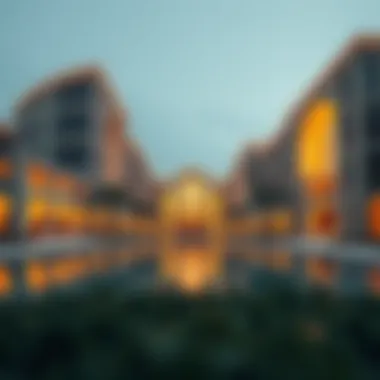

Architectural designs in premium developments serve as cultural cornerstones for the city. They are not merely buildings; they encapsulate cultural stories and history. Architecture has a remarkable ability to communicate the identity and aspirations of a city and its people. For example, the design of Madinat Jumeirah pays homage to traditional Arabic architecture, resonating with local heritage while appealing to international tastes.
Moreover, aesthetic contributions cannot be overlooked; they shape the overall experience of living and working in Dubai. High-end developments are now outfitted with art installations, designer landscaping, and themed environments, creating immersive experiences. Beyond that, these projects often host galleries or performance spaces, enriching community life and enhancing cultural offerings. In summary:
- The architectural design influences local identity and international perception.
- Aesthetic elements enhance both property value and living experience.
"Good architecture can create places where people want to live, work, and play, while also honoring the environment and cultural heritage."
Understanding the Target Demographics
Understanding the target demographics within the realm of pure gold real estate development in Dubai is pivotal. This section is not just a mere checkbox on the list of considerations; it’s the cornerstone that shapes marketing strategies, design choices, and ultimately, investment opportunities.
Identifying the right demographic allows developers and investors to tailor their projects in a manner that reflects the lifestyle and preferences of potential buyers and investors. This deeper insight into the demographics leads to better pricing strategies, which can markedly impact sales success. When you know who is truly interested, you can market the properties more effectively, showcase the right features, and create a narrative that resonates with target audiences.
In the context of Dubai, an ever-evolving melting pot of nationalities, understanding demographic shifts can also unveil emerging middle-class sectors that are looking for residential options in high-end developments. Consequently, this knowledge can lead to innovative ideas in community amenities and architectural design that appeal across varying cultural backgrounds, significantly enhancing the value of investments.
Profiles of Potential Buyers and Investors
The buyer profile in Dubai’s luxury real estate market can be quite eclectic. On one end, you have affluent individuals from the Middle East with specific high-end tastes. These buyers often lean towards exclusive features like penthouses with panoramic views or villas situated close to cultural landmarks.
Then there are expatriates—professionals on the move, looking for a sound investment or a luxurious place to live. They tend to be young professionals, families, and retirees who appreciate good schools, recreational facilities, and lifestyle conveniences. The willingness of this group to invest in property in Dubai also points towards a growing trend of buyers who are not just concerned about living space but also about lifestyle enhancements.
Investors also come from various sectors including overseas investors from Europe and North America keen on earning rental income or benefitting from rising property values. Many of these individuals see properties in Dubai as more than just a home; they view them as a passport to a lucrative market, making demographic analysis an essential strategy.
In summary, recognizing who potential buyers are will not only help in crafting the right message but also play an integral role in elevating the appeal of developments in the highly competitive Dubai marketplace.
Expatriate Interest and Market Dynamics
Expatriates form the backbone of Dubai's real estate market, contributing substantially to the demand for high-quality developments. Their unique interests significantly influence market dynamics. The influx of global talent in areas like technology, finance, and healthcare has led to a surge in demand for properties that align with modern living.
In many ways, expatriate communities act as trendsetters within this market. They often prefer properties that offer integrated community living—mixing work, play, and leisure—all under one roof. This brings forth a notable challenge for developers who must anticipate expatriate needs, creating spaces that facilitate easy access to amenities like gyms, schools, and public transport.
"Understanding the expatriate market is crucial, as they often are the first movers in high-end property segments. When they invest in a home, they bring along their networks, which can further drive demand."
Moreover, fluctuating currency exchanges, taxation policies, and job market stability can create a dynamic environment. For instance, the recent boom in remote work has reshaped preferences, with many expatriates now seeking larger spaces or work-from-home compatibility. Not only does this shift present opportunities for developers to craft tailored solutions, but it also underscores the importance of market intelligence.
By keeping a close ear to the ground regarding expatriate insights and evolving demands, stakeholders can harness opportunities to capitalize on Dubai's growing real estate market.
Regulatory Framework Governing Real Estate Development
The realm of real estate development, particularly in a dynamic market like Dubai, is tightly interwoven with a robust regulatory framework. Understanding this foundation is pivotal for anyone looking to either invest, develop, or buy properties in the emirate. The significance of these regulations cannot be overstated; they ensure transparency, uphold quality standards, and protect the interests of all stakeholders involved – from developers to investors, even the general populace.
Understanding Property Laws in Dubai
The property laws in Dubai present a dual nature, catering specifically to both locals and expatriates. One of the cornerstone regulations is the Dubai Land Department (DLD), which administers property transactions and registration. This governmental body provides a framework that governs ownership, leasing, and property development. A notable legal instrument is the Law No. 13 of 2008, which outlines the rights of property owners, making it accessible for foreign nationals to acquire freehold properties in designated areas. This advancement has lured a wave of investors looking to settle in the city.
Moreover, the laws dictate strict guidelines on property maintenance and use. This ensures developments maintain not only structural integrity but also aesthetic appeal. Understanding these laws is essential. For instance, if a developer fails to comply with proper licensing through DLD, it could lead to penalties or even project termination.
"Understanding the legal landscape is almost as critical as the property’s location itself. It sets the stage for a successful transaction and secure investment."
This makes it imperative for investors and developers alike to keep abreast of regulatory changes, which can often reflect shifts in market demands or government policy. In recent years, measures that promote sustainability and responsible development have come into play. Laws requiring green building standards align with global best practices, aiming to promote energy efficiency and lower resource consumption.
Compliance Standards for Developers
Compliance standards for developers in Dubai are established to uphold the integrity of the real estate market and to protect consumer rights. Developers are expected to adhere to specific regulations that encompass a myriad of factors such as environmental impact, safety codes, and construction quality.
- Pre-Construction Regulations: Before breaking ground, a developer must secure all necessary permits. This typically includes approvals from various governmental bodies, including Dubai Municipality and Civil Defense for safety compliance.
- Construction Compliance: During the building phase, developers must follow the Dubai Building Code, which defines the parameters for safety, efficiency, and environmental considerations. Engineers and construction teams regularly undergo inspections to ensure adherence to these standards.
- Post-Construction Obligations: After the completion of a project, developers are often required to participate in maintenance programs to ensure ongoing compliance with safety and quality standards, potentially preventing future liabilities.
Moreover, developers that maintain compliance can benefit from incentives such as expedited processing for future projects or tax advantages, thus making compliance not just a legal necessity, but also a strategic advantage.
By ensuring adherence to these stringent compliance measures, developers can not only enhance the value of their projects but also contribute positively to the broader community in Dubai, aligning with economic and urban development goals.
In summary, navigating the regulatory framework in Dubai's real estate market is intricate yet essential. Stakeholders must recognize the crucial laws and compliance standards that govern their actions to foster a stable and prosperous market.
Strategies for Investment in Pure Gold Real Estate
Investing in pure gold real estate in Dubai is no small potatoes; it's a complex endeavor, but not without its rewards. In order to navigate this high-stakes market, a strategic approach is essential. By focusing on specific elements and understanding the benefits, investors can make informed decisions that could yield notable returns.
Market Analysis and Investment Techniques
Market analysis is the bedrock of any sound investment strategy. It requires gathering and interpreting data on the current real estate trends in Dubai. One can’t simply throw darts at a board and hope for the best; it involves some serious groundwork.
First off, keeping an eye on macroeconomic indicators like GDP growth, interest rates, and employment levels can provide insights on the market’s health. Moreover, analyzing population trends and migration patterns helps one understand demand. For example, the influx of expatriates contributes significantly to the rental market.
- Key Indicators to Monitor:
- Population Growth: Increased residents lead to higher demand for housing.
- Construction Activity: More permits mean a growing supply.
- Rental Yields: Who doesn’t love cash flow? This is a crucial metric.
Investors may also want to utilize tools like comparative market analysis (CMA). This technique can shed light on property value trends in various neighborhoods. Knowing what similar units are selling for can give you leverage when making offers. Ultimately, a detailed understanding of the market allows for better investment techniques, which enhances the chances of success.
"Knowledge in the marketplace often translates to confidence in negotiations. Understanding local nuances can give an investor the upper hand."
Risk Management and Portfolio Diversification
Just like any other investment, venturing into pure gold real estate comes with its fair share of risks. This is where risk management steps in, a crucial element in safeguarding your investments. Without it, you might as well throw your money into the wind.
One effective tactic is portfolio diversification. Rather than investing all your funds into one luxurious property, spreading your investments across different developments and property types can mitigate risk. This means not placing all your eggs in one basket. Think about mixing residential properties with commercial units.
- Strategies for Diversification:
- Invest in Different Areas: Properties in various neighborhoods can offer insights into varied market conditions.
- Mix Property Types: Consider a blend of residential, commercial, and even vacation rentals. Each has its own market cycle.
- Invest in REITs: Real Estate Investment Trusts allow you to invest in real estate without having to physically own properties, minimizing direct risk.
Managing risks may also involve obtaining insurance and being aware of regulatory changes that can impact investments. Given the dynamic environment in Dubai, staying informed about new policies is vital.
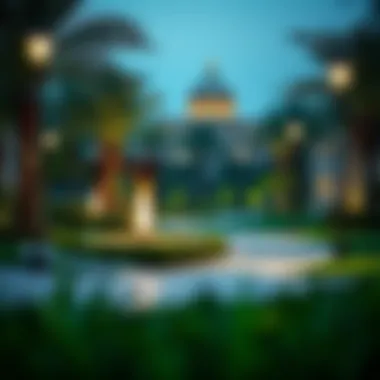

Challenges Facing High-End Developments
Exploring the landscape of pure gold real estate development in Dubai intricately weaves in facing challenges, particularly those linked to high-end developments. The significance of understanding these challenges cannot be overstated. High-end developments attract substantial investment and high-profile clientele, making them not just residential spaces but also symbols of luxury. Yet, they operate in a realm that is riddled with uncertainty—from economic shifts to environmental concerns. A savvy investor or developer must navigate these complexities with insight to optimize their investments and avoid pitfalls.
Economic Fluctuations and Market Volatility
When it comes to high-end real estate, economic fluctuations play a crucial role. What goes up might not always come down smoothly. The Dubai market, while vibrant and attractive, is not immune to global economic forces. Changes in oil prices, interest rates, and global economic conditions can have a ripple effect. For instance, during economic downturns, luxury properties often see a dip in demand. Investors may find that properties, once considered gold mines, begin to shine a little less brightly when economic conditions sour.
Key factors influencing this volatility include:
- Global Economic Trends: As the world’s markets shift, so do the fortunes of local real estate. A downturn in major economies can lead to reduced foreign investment.
- Speculative Investments: Investors, driven by the potential for quick profits, can inflate property values without solid backing, creating a bubble that is prone to bursting.
- Currency Fluctuations: Since Dubai attracts a global clientele, variations in currency rates can impact purchasing power.[^1]
To mitigate these risks, a solid understanding of economic indicators and market trends is indispensable. Regular market analysis and adjustment of investment strategies can make a notable difference.
Environmental and Social Concerns
High-end developments are not solely about luxury and wealth; they also bring significant environmental and social implications. With Dubai's rapid growth, the effects on local ecosystems and communities can be profound. Developers are increasingly held accountable, and moving forward, the pressure to be socially responsible has never been greater.
Key concerns include:
- Sustainability Practices: Properties constructed without attention to sustainable practices risk being viewed as outdated and undesirable. This means integrating green technologies, energy-efficient designs, and water conservation methods in all new developments.
- Impact on Local Communities: The construction of high-end projects can disrupt long-standing communities, leading to displacement and social tensions. Developers need to engage with local residents and stakeholders early in the planning process to avoid potential backlash.
- Cultural Heritage Preservation: Maintaining and respecting the cultural fabric of Dubai is crucial. Developments that overlook this aspect may face opposition from both locals and global observers demanding respect for culture and tradition.
Balancing luxury with responsibility requires a careful approach. Engaging with environmental experts, social researchers, and community leaders can provide insights that help pave the way for harmonious development. The focus here is on creating enduring value that benefits not just the investors but the community as a whole.
In summary, while high-end developments present attractive opportunities, they come with their share of challenges. Investors need to remain vigilant and informed to navigate the complexities of this dynamic market.
[^1]: For a deeper understanding of economic indicators impacting real estate, visit Investopedia for extensive resources.
Future Projections for Gold Standard Developments
Looking ahead, the landscape of pure gold real estate developments in Dubai continues to evolve, with numerous factors poised to influence its future trajectory. Investors and stakeholders in the Dubai market need to pay attention to how these elements unfold. Understanding future projections is not merely about anticipating market trends, but rather, it's an essential part of formulating strategic decisions. The benefits of keeping an eye on these projections include informed investment choices, mitigating risks, and tapping into emerging opportunities. Furthermore, being in the know about future developments enhances the potential for substantial returns on investment.
Emerging Trends Shaping the Market
The real estate sector in Dubai is undergoing a metamorphosis driven by various trends. One of the most notable trends is the increasing focus on luxury living — properties that not only provide shelter but also an unparalleled lifestyle. This includes waterfront properties, high-rise apartments with breathtaking views, and exclusive villas in prestigious communities. Interest in mixed-use developments is also rising. These projects blend residential, commercial, and recreational spaces, fostering community living while providing residents with accessibility to amenities. Additionally, integration of technology in developments, such as smart home systems, is becoming a standard expectation rather than a luxury.
Investors should keep an eye on the following key trends:
- Smart Cities: The concept of smart living is gaining momentum, where urban planning incorporates technology to enhance the quality of life.
- Short-Term Rentals: With the growing popularity of platforms like Airbnb, short-term rental properties continue to attract significant interest, offering a quick return on investment.
- Cultural Influence: Developments that reflect the unique heritage and culture of Dubai are appealing to both locals and expatriates. This cultural integration enhances the value proposition of properties.
Sustainability and Innovation in Future Projects
In today's rapidly changing environment, sustainability is not just a trend; it’s a necessity. Future projects in the pure gold segment of Dubai's real estate market are increasingly adopting innovative sustainability practices. Developers are now prioritizing green building materials, energy-efficient technologies, and sustainable construction practices. This shift is not only beneficial for the environment but also appeals to a conscious market segment that seeks eco-friendly living options.
Moreover, innovative designs that prioritize natural light and open spaces are gaining traction. Builders are considering how developments can harmonize with nature to create a seamless blend of architecture and the environment.
The rise of
- Renewable Energy Sources: Solar panels and energy-efficient appliances are setting the standard for modern developments.
- Water Conservation Practices: Smart irrigation systems and recycled water usage are becoming common as part of sustainable design.
- Community Gardens and Green Spaces: These not only enhance the aesthetic appeal but provide residents with spaces for recreation and relaxation.
A forward-thinking approach towards sustainability in real estate resonates well with potential buyers and creates a positive image for developers. In summary, as Dubai’s luxurious real estate market expands, those involved should keep these trends in sight to stay ahead in the game.
Case Studies of Successful Developments
Case studies serve as a bridge between theory and practice, showcasing how concepts of pure gold real estate translate into real-world scenarios. When we look at successful developments in Dubai, we uncover a treasure trove of insights—insights that extend beyond mere numbers. They embody the blend of creative architecture, strategic investment, and community impact which define real success in the realm of high-end real estate.
These case studies not only illustrate the heights that can be achieved but also highlight the unique strategies and considerations that went into each project. By examining successful examples, investors, developers, and realtors can glean valuable lessons that inform future endeavors and help navigate the complexities of the Dubai real estate market.
Highlighting Noteworthy Projects
Among the pantheon of exemplary real estate developments in Dubai, the Burj Khalifa stands tall, both literally and metaphorically. It's more than just a skyscraper; it represents a hallmark of luxury living and architectural prowess. Its amenities, from lavish residences to world-class dining, cater to an elite clientele, often drawing expatriates and investors alike. The success of Burj Khalifa lies in its ability to merge luxury with functionality, telling a story of ambition and vision.
Another notable mention is the Dubai Marina, a sweeping development that redefined waterfront living. By integrating residential, retail, and lifestyle elements, it transformed what it means to live on the coast. It stands as a symbol of how developers can leverage natural resources to create vibrant communities. The intrinsic value of Dubai Marina isn’t just in its aesthetics but in how it has fostered a sense of community among residents.
- The strategic location along the coast is key.
- Mixed-use developments attract a diverse demographic.
- Promenade lifestyle adds to the attraction.
Additionally, the Palm Jumeirah exemplifies the innovative edge of Dubai's real estate. This artificial archipelago is more than a visual marvel; it provides lucrative opportunities for diverse investments, from luxury hotels to high-end villas. The unique shape of the palm, when viewed from above, has become an iconic representation of Dubai itself. Homeowners and tourists alike find themselves drawn to its lavish accommodations and pristine beaches, providing a high return on investment that justifies the premium prices.
Lessons Learned from Established Developments
What these projects collectively teach aspiring developers is invaluable. First off, market research and understanding buyer preferences cannot be overstated. The demand for lifestyle amenities, proximity to waterways, and the integration of technology in homes are aspects that can make or break a project. Looking at the Burj Khalifa and Dubai Marina, it is evident that merging business with leisure has proven effective in attracting residents and maintaining high occupancy rates.
A strengthened community environment plays a vital role too. Developers need to think beyond the physical structure; the experience of living there matters just as much. The social infrastructure around these developments—parks, shopping areas, and educational facilities—contributes massively to the attractiveness of the area. A project that encompasses these aspects creates a more welcoming atmosphere, fostering community spirit among its residents.
Moreover, environmental consciousness is no longer optional; it’s an expectation. Successful developments are adapting to incorporate sustainable practices, like efficient energy use and green spaces. As global awareness of environmental issues increases, investors are keen on backing projects that acknowledge this shift.
"In the end, it's not just building a structure. It's about creating a vibrant community that resonates with the people who live, work, and play there."
Community and Social Infrastructure Around Developments
Community and social infrastructure play a crucial role in shaping the value and appeal of pure gold real estate in Dubai. High-end properties often come with a promise of not just luxurious living conditions, but also thriving community spaces and essential services that enhance the overall lifestyle of residents. The success of these developments hinges on their ability to foster a sense of connection and well-being amongst occupants while providing necessary amenities.
Amenities and Lifestyle Enhancements
One of the most attractive aspects of pure gold real estate is the superior amenities that accompany these high-end developments. These can range from state-of-the-art gyms, swimming pools, wellness centers, to lush green parks and walking trails.
Here are some key features that elevate the living experience:
- Health and wellness facilities: Spa-like environments with personal trainers and nutritionists integrated into the living spaces.
- Entertainment options: Multiscreen movie theaters, rooftop lounges, and social clubs that create an atmosphere of exclusivity and festivity.
- Educational amenities: On-site schools and childcare facilities designed to enrich the upbringing of children in a nurturing environment.
These amenities not only cater to the convenience of the residents but also create a vibrant community feel. The lifestyle enhancements these developments offer contribute to building relationships and a shared sense of belonging.
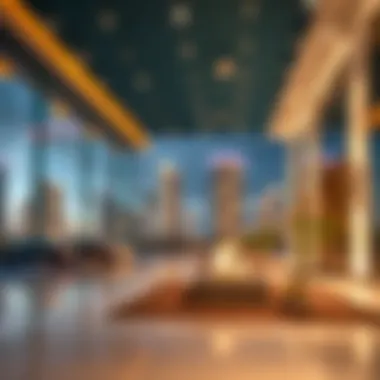
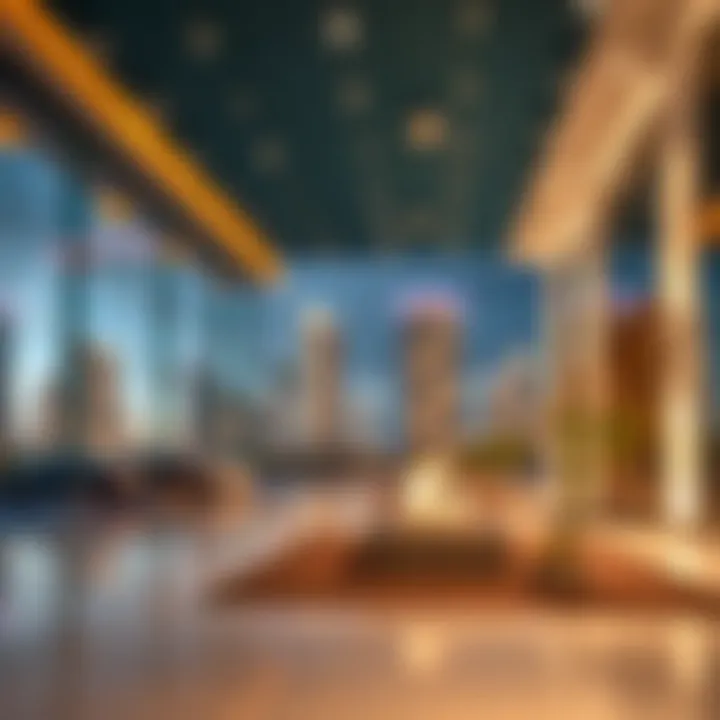
Impact on Local Communities
The development of high-end real estate in Dubai is not solely focused on the affluent buyers but has a ripple effect that can benefit local communities. When luxury developments are constructed, they boost local economies:
- Job creation: New developments require various professionals and laborers, providing numerous job opportunities for residents.
- Infrastructure development: Investments in real estate often spur upgrades to surrounding areas, including roads, public transport, and essential services.
- Community engagement: Luxury developments often host events that involve local populations, promoting a sense of inclusivity.
"In essence, when a new premium development arises, it doesn't just enrich the lives of its residents; it has the potential to uplift the community around it, creating a win-win scenario for everyone involved."
Technological Innovations in Real Estate
The landscape of real estate, especially in burgeoning markets like Dubai, is evolving rapidly, driven largely by technological innovations. Embracing technology is no longer a luxury but a necessity in the competitive realm of pure gold developments. From smart technologies that enhance living experiences to digital platforms that streamline transactions, the importance of these innovations can't be overstated. They not only increase efficiency but also provide developers and investors with the tools they need to make informed decisions.
Smart Home Technologies and Trends
Smart home technologies are reshaping residential spaces and offering convenience that once seemed like science fiction. In Dubai, where luxury meets cutting-edge design, these technologies are incorporated into various real estate projects to enhance comfort, security, and accessibility.
- Automation: Smart systems can control lighting, heating, and security through mobile devices, creating not just comfort but also energy efficiency. For instance, a home equipped with a smart thermostat can learn the homeowner's habits and adjust temperatures accordingly, making it efficient and eco-friendly.
- Security Features: Innovations like smart cameras and biometric locks provide unparalleled security to residents, offering peace of mind. Homeowners can monitor their properties remotely, which is particularly appealing to expatriates who travel frequently.
- Integration with IoT: The Internet of Things connects various devices, allowing homeowners to create tailored environments. Imagine adjusting your lights, umbrella shades, or even the coffee machine, all with a simple voice command. This level of integration defines modern luxury living.
In addition, trends such as health-focused smart homes, equipped with air quality sensors and fitness tracking features, are gaining traction, catering to the increasing health-conscious population.
Digital Platforms for Real Estate Transactions
Digital platforms have revolutionized how real estate transactions are conducted, making the buying, selling, and leasing processes much more efficient and user-friendly. Real estate professionals in Dubai are embracing these platforms to keep up with the fast-paced market.
- User-Friendly Interfaces: Many platforms now boast intuitive designs that allow buyers and sellers to navigate listings with ease. Whether it’s browsing properties via mobile apps or using VR technology to take virtual tours, the experience is streamlined.
- Data Analytics: The ability to analyze market data in real time helps investors make better-informed decisions. For instance, platforms equipped with analytical tools can predict market trends, offering insight into price fluctuations and investment viability.
- Blockchain Technology: Although still in its infancy within real estate, blockchain has the potential to simplify transactions further by creating transparent and secure records. This technology could reduce fraud and lower transaction costs significantly, making investments in Dubai more attractive to international buyers.
"The future of real estate lies in embracing technology, as it transforms the way we live, work, and invest."
For additional resources, check out Wikipedia, Britannica, and platforms like Reddit for community discussions.
The Role of Real Estate Agents in This Market
In the rapidly evolving landscape of pure gold real estate development in Dubai, the role of real estate agents becomes crucial. These professionals facilitate transactions, bridging the gap between buyers and sellers while navigating a complex market filled with unique properties and investment opportunities. Here’s why understanding their role is imperative for anyone looking to invest in this luxurious segment.
Navigating Buyer and Seller Interests
Real estate agents play an instrumental role in ensuring that both buyers and sellers find common ground. They bring extensive market knowledge to the table, which is especially valuable in a place like Dubai, where trends can shift on a dime. Here are some benefits of engaging a real estate agent:
- Market Insights: Agents provide invaluable insights into local market trends, pricing strategies, and emerging neighborhoods. Without their expertise, investors may find themselves drifting in uncharted waters.
- Negotiation Skills: Skilled negotiators, agents work tirelessly to secure the best deal for their clients. Whether buying or selling, having someone in your corner can make all the difference in securing favorable conditions.
- Time and Convenience: For busy investors or expatriates, agents handle the heavy lifting. This includes property viewings, documentation, and follow-ups, freeing clients to focus on other essential aspects of their lives.
An effective agent will carefully manage the expectations of both parties, ensuring smooth transactions that align with the specific needs of each client.
Strategic Partnerships in Development
The landscape of pure gold real estate development is not just about individual transactions; it's also about fostering robust partnerships. Real estate agents often collaborate with various stakeholders to unlock opportunities that aren’t always visible on the surface.
- Collaboration with Developers: Many agents have established relationships with major developers in Dubai. This insider access can lead to exclusive listings and opportunities, opening doors for investors to consider projects that might not yet be publicly available.
- Networking with Financial Institutions: Successful real estate transactions often require financing. Agents frequently liaise with banks and mortgage lenders to find the best financing options for buyers, ensuring that financial barriers don’t impede investment decisions.
- Connecting with Local Authorities: Understanding the regulatory environment is vital in real estate. Agents equipped with knowledge on compliance issues and governmental processes can guide investors more effectively, saving them from potential legal entanglements.
In summary, real estate agents are more than just facilitators; they are strategic partners that add significant value. Their expertise not only enhances the buying or selling experience but also plays a pivotal role in shaping the market dynamics within Dubai’s thriving real estate sector.
"A competent real estate agent can turn an ambiguous venture into a clear path toward successful investment."
By harnessing the power of strategic relationships and honed negotiation skills, agents contribute substantially to the success of pure gold developments, making them essential allies in the pursuit of lucrative real estate opportunities.
Investing in Dubai: A Comparative Analysis
Investing in Dubai’s real estate market is like diving into a pool of opportunities where the water is crystal clear with potential. It stands out as a prime location for investors from all corners of the globe. What makes Dubai particularly alluring are its unique market dynamics, rich cultural landscape, and robust infrastructure. Understanding these nuances is crucial for both seasoned and budding investors.
Dubai vs. Other Global Markets
When you stack Dubai against other global markets, a few stark differences become evident.
- Regulatory Environment: In Dubai, regulations are clear-cut, allowing for smoother transactions. Comparatively, markets in places like New York or London can be bogged down with extensive documentation and bureaucracy. This efficiency is a significant advantage.
- Tax Incentives: Dubai offers a haven for investors through its zero personal income tax policy. This is a striking contrast to hefty tax burdens found elsewhere. Investors looking to maximize their returns often find this aspect a game-changer.
- Investment Opportunities: Alternative markets may offer options, but Dubai truly boasts premium properties that cater to various demographics, but particularly those seeking luxury living or high-potential developments. The diversity in property types – be it residential, commercial, or mixed-use spaces – makes it a playground for various investors.
- Capital Appreciation: Historical data shows that property values in Dubai have at times outpaced many global cities, largely due to its strategic location as a business hub. This capital appreciation can be particularly enticing for those in it for the long haul.
Understanding these differences can provide investors with a clearer perspective. It’s about knowing where to cast your net and what local characteristics can make or break an investment.
Attractiveness for Foreign Investors
Dubai's real estate market has become a beacon for foreign investments, drawing interest like moths to a flame. Let’s unpack what underlines this magnetic attraction:
- Cultural Melting Pot: The cosmopolitan nature of Dubai appeals to expatriates and travelers alike, creating a vibrant communal experience. This multicultural environment fosters a sense of belonging, which in turn boosts the appeal of owning property.
- Safety and Security: Investors feel at ease knowing that Dubai is one of the safest cities in the world. High safety standards, low crime rates, and a politically stable environment provide a fortress-like assurance for those entrusting their funds.
- World-Class Infrastructure: From futuristic transport systems to luxurious amenities, the infrastructure in Dubai is clockwork-efficient. Connectivity to global markets, especially through the Dubai International Airport and major highways, is a draw for investors looking for strategic investments.
- High Rental Yields: The rental yields in Dubai often outperform other competitive markets. Property owners can expect a return on investment that many global markets can’t match. This aspect is key when considering a long-term investment strategy that goes beyond merely buying and holding.
- Visas and Incentives: The UAE has rolled out initiatives like the Golden Visa, which has further made it easier for foreign investors to settle and work in the region. This has led to a surge in purchases, ensuring that investment in property goes hand-in-hand with the opportunity to live and work in a thriving economy.
Investing in Dubai isn’t just about acquiring a property; it’s a multi-layered experience that combines potential financial gain with lifestyle possibilities.
"In the world of real estate, location may reign supreme, but the broader market climate and investor support systems can seal the deal in ways that are often underestimated."
Culmination: The Future of Pure Gold Developments
The landscape of real estate in Dubai is like a canvas, continuously evolving and expanding, particularly within the realm of pure gold developments. As we draw the curtains on this extensive discussion, it's vital to recognize the profound significance of understanding where this market is heading. Investors, developers, and real estate enthusiasts alike should take note of the unique attributes that distinguish these high-end projects and their potential impact on the broader economy.
Summarizing Key Insights and Directions
As we dissect the various threads of this intricate subject, several key insights emerge that can guide future endeavors in the Dubai real estate market:
- Sustained Demand for Luxury: The appetite for premium properties remains insatiable. From expatriates seeking luxury homes to investors eyeing rentals, the demand continues to grow.
- Integration of Innovation: Future pure gold developments will likely incorporate cutting-edge technology. This spans smart home integrations that enhance living experiences, to sustainable building practices that align with ecological considerations.
- Economic Resilience: Even amidst fluctuating global markets, Dubai's real estate sector has shown a remarkable ability to adapt, demonstrating resilience that bodes well for future investments.
- Diverse Demographics: Understanding the changing demographics is crucial. Expatriates and high-net-worth individuals are continuously reshaping buyer profiles and preferences.
These insights underline a significant direction: while challenges undoubtedly exist, the trajectory for pure gold developments points towards a flourishing future.
Final Thoughts on Market Trajectories
Looking ahead, the nascent trends in real estate development underscore a future rich with opportunity but not without its own share of complexities. The market is veering towards a blend of luxury and sustainability—a combination increasingly favored by discerning buyers. With the regulatory framework becoming more refined, investors can expect a more stable environment conducive to growth.
Moreover, as long as Dubai continues to position itself as a global hub, the real estate segment will evolve dynamically, responding to both local and international influences. This adaptability will be crucial for those invested in the market.
In summary, the future of pure gold developments in Dubai is luminous yet layered with intricacies. For stakeholders, it is imperative to stay abreast of these trends, engage with emerging technologies, and remain attuned to the needs and preferences of the evolving buyer demographic.
“In the face of uncertainty, the clear vision always shines through—embracing innovation and adaptability is the key to success in Dubai’s real estate realm.”
Whether you're looking to invest, buy, or simply understand this unique landscape, keeping these insights in mind will be crucial as we navigate the path forward in this vibrant and lucrative market.















